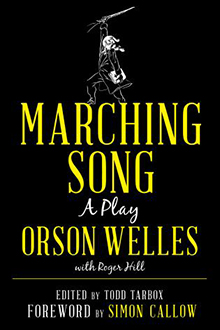| Marching Song | |
|---|---|
 First edition First edition | |
| Written by |
|
| Original language | English |
| Subject | John Brown (abolitionist) |
| Genre | Historical drama |
Marching Song is a play about the legend of abolitionist John Brown, written in 1932 by Orson Welles and Roger Hill. It is most notable for its narrative device of a journalist piecing together a man's life through multiple, contradictory recollections—a framework that Welles would famously employ in his 1941 film, Citizen Kane. Although the play has never been professionally performed, an abridged version of Marching Song was presented in June 1950 at the Woodstock Opera House in Woodstock, Illinois, a world-premiere benefit production by the Todd School for Boys. Rowman & Littlefield will publish the play in August 2019.
History
In March 1932, two months shy of his 17th birthday, Orson Welles returned to Chicago from his post-graduation trip to Europe and his time with the Gate Theatre in Dublin. Finding that he had few prospects despite his success in Ireland, Welles persuaded Roger Hill, his former teacher and lifelong friend, to collaborate with him on a biographical play about abolitionist John Brown and his efforts to organize a slave revolt in 1859. In May, Welles visited Harper's Ferry and other historic sites with Hill, who was leading a two-week field trip for boys attending the Todd School. In August, Welles retreated to Lac du Flambeau, Wisconsin, and stayed at the summer home of James B. Meigs and his family while he wrote the play. Welles typed a cover page that credits the play as being by "Orson Welles and Roger Hill"; Hill said he wrote only a few scenes that Welles edited and reworked.
"My own contribution to writing that play was a first draft of a first act," Hill recalled. "In other words, just enough to start our tireless boy off and, more importantly, send him off. Out of my hair."
Production
Though Welles's complete playscript for Marching Song has not been produced, the Todd School for Boys presented an abbreviated world premiere of the play June 7–8, 1950, at the Woodstock Opera House. Hascy Tarbox, Welles's Todd School classmate and Hill's son-in-law, trimmed the four-hour play to two hours and staged the two performances for the benefit of the Woodstock Hospital.
Publication
A copy of the typescript, including Welles's sketches and set design instructions, is held by the Lilly Library at Indiana University in Bloomington, Indiana.
On September 30, 1985, Hill told Welles that he had located his own copy of the play, which he planned to give him. "For my money it remains a compelling, if overly long, play. If that God-awful Hearts of Age … is worth saving, Marching Song, written two years earlier, should rate a Pulitzer. At least it's worth publication."
Rowman & Littlefield Publishing Group of Maryland announced it will publish the play in August 2019 – 87 years after it was written. It will be accompanied by two essays written by Hill's grandson, Todd Tarbox, which put the work in historical context and examine Welles's progressive politics.
References
- Gilpin, R. Blakeslee (2011). John Brown Still Lives!. Chapel Hill: University of North Carolina Press. ISBN 9780807835012.
- ^ McGilligan, Patrick (2015). Young Orson. New York: Harper. ISBN 978-0-06-211248-4.
- Welles, Orson; Hill, Roger (2019) . Tarbox, Todd (ed.). Marching Song: A Play. Rowman & Littlefield. ISBN 978-1-5381-2552-6. Retrieved April 3, 2019.
- "Chicago Schoolboy Who Won Place on Dublin Stage Returns". Chicago Tribune. March 18, 1932. Retrieved 2016-07-21.
- Brady, Frank (1989). Citizen Welles: A Biography of Orson Welles. New York: Charles Scribner's Sons. ISBN 0-385-26759-2.
- ^ Hill, Roger (1977). One Man's Time and Chance, a Memoir of Eighty Years 1895 to 1975. Privately printed; Woodstock Public Library collection, digitized by Illinois State Library. Archived from the original on 2014-09-07. Retrieved 2016-07-21.
- Welles, Orson; Bogdanovich, Peter; Rosenbaum, Jonathan (1992). This is Orson Welles. New York: HarperCollins Publishers. p. 330. ISBN 0-06-016616-9.
- ^ Tarbox, Todd (2013). Orson Welles and Roger Hill: A Friendship in Three Acts. Albany, Georgia: BearManor Media. p. 270. ISBN 978-1-59393-260-2.
- "Theatre, 1936–1947 (Box 5, f. 14-Box 7, f. 22)". Guide to the Orson Welles Materials in the Lilly Library. Lilly Library, Indiana University Bloomington. 6 December 2013. Retrieved 2016-07-21.
Purchased. Orson Welles, New York, N.Y., and Richard Wilson, Santa Monica, Calif. 1978.
- "Orson Welles play 'Marching Song' set for publication". Wellesnet | Orson Welles Web Resource. 2019-04-02. Retrieved 2019-04-02.